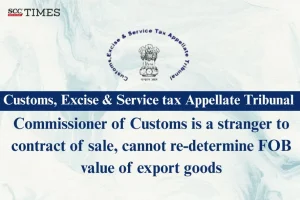CESTAT New Delhi: In an appeal against the order dated 24-3-2011, passed by Commissioner of Customs Tughlakabad (impugned order), the two-member bench of Dilip Kumar,J. (President) and P.V. Subba Rao (Technical member)*, held that the Commissioner had no authority to re-determine the Free on Board (‘FOB’) values of the export goods and accordingly set aside the impugned order. The Tribunal further stated that the Commissioner or any customs officer, being a stranger to the contract of sale, would have no authority to re-determine the transaction value under the FOB.
Background
The appellants had exported garments and claimed benefits under Drawback and Duty Exemption Passbook Scheme (‘DEPS’) as a percentage of the FOB value of the exported goods. The Directorate General of Revenue Intelligence (‘DGRI’) had received intelligence that the appellants were over-valuing the garments to avail excess drawback and DEPS benefits and thus officers of the DGRI had examined the consignment of goods. The impugned order had rejected the declared FOB values and re-determined the FOB values under Section 14 of the Customs Act, 1962 (Customs Act) read with Customs Valuation (Determination of Value of Export Goods) Rules, 2007 (Valuation Rules).
The issue for consideration before the CESTAT was whether the Commissioner or any customs officer had the power to re-determine the FOB value of export goods.
Analysis, Law and Decision
The Tribunal noted that FOB, being an International Commercial Term (‘INCOTERM’), indicated rights and liabilities of buyers and sellers in international trade. Where goods are bought and sold on FOB basis, the seller becomes free of all costs and risks associated with the transportation of goods as soon as the goods are put on board the vessel or aircraft. FOB value is the transaction value of the goods agreed to between the buyer and the seller and as such, only the parties to the contract of sale may determine it. The Tribunal further noted that no stranger to the contract, including any customs officer would have any role in determining or changing the FOB value.
The Tribunal observed that Section 14 of the Customs Act, on the other hand, provided for determination of ‘value’ of imported or exported goods which shall be the ‘transaction value’ but it may be rejected or re-determined by the proper officer following some other method as per the Valuation Rules. The Tribunal further stated that a combined reading of Sections 14 and 2 (2) of the Customs Act made it evident that the value determined under Section 14 is for the purpose of assessment of duty. The Tribunal noted that the proper officer is at the liberty to reject the transaction value as the assessable value and determine the assessable value through some other methods such as value of contemporaneous export goods of similar market assessment etc. However, this re-determination would not change the transaction value.
The Tribunalfurther observed that while duty is to be paid on the assessable value, drawback, DEPS and other export benefits are generally notified as a percentage of the FOB value. The exporter would receive remittance and be entitled to receive export incentives as per his transaction value since the exporter’s obligation to realise foreign exchange is based on the transaction value.
Therefore, the Tribunal held that the Commissioner had no power to re-determine the FOB value of export goods. The FOB value can only be determined by the parties to the contract and no stranger to the contract, including a customs officer, could change the FOB value of the goods.
Consequently, the Tribunal held that the impugned order, passed by the Commissioner, was without authority of law and was therefore liable to be set aside.
[Mahir Fashions v. Commissioner of Customs New Delhi, 2025 SCC OnLine CESTAT 2103, decided on 22-7-2025]
*Order by: P.V. Subba Rao, Technical Member
Advocates who appeared in this case:
For the Appellant: Prabhat Kumar, Pralabh Mathur, Advocates
For the Respondent: Rakesh Kumar, Authorised Representative

